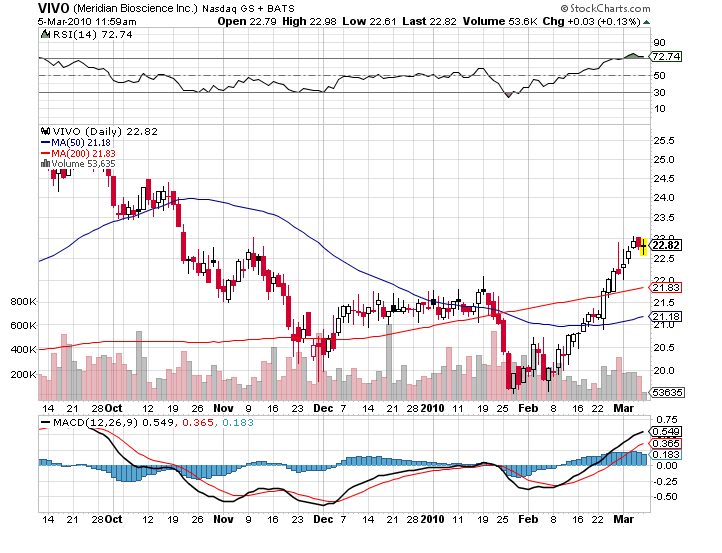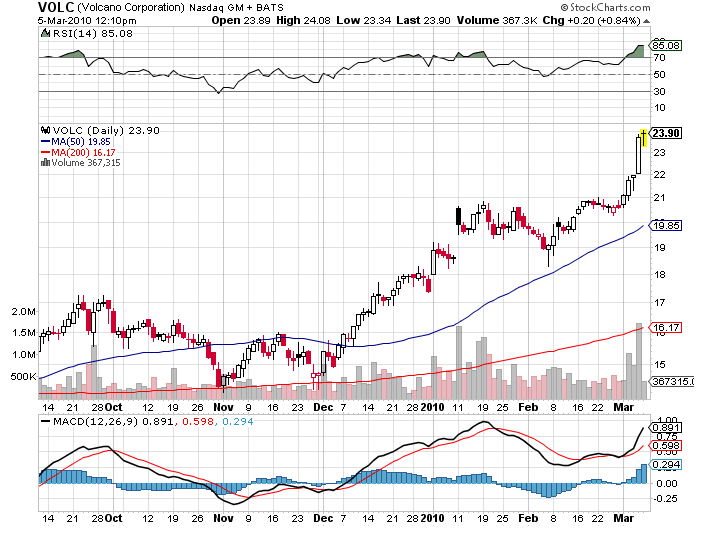Divine Device Companies
Courtesy of Pharmboy at Phil’s Stock World
Health care equipment sub-industry for the next 12 months is neutral according to the S&P reports. The core product categories are historically recession-resistant and will continue to grow regardless of still restrictive credit market conditions that may ultimately affect spending decisions at the hospital customer base. However, there is concern about hospital capital equipment spending amid tight credit market conditions and stressed municipal and state budgets, and there is mounting evidence of slowing demand for elective medical procedures and reduced procedure rates in areas that are not normally viewed as elective, such as interventional cardiology and orthopedics.
The risks presented by proposed health care reform legislation have dissipated, as the Democrats no longer have a filibuster-proof supermajority, thereby sharply reducing the chances of the legislation passing or having a more detrimental impact on the sector. Estimated 2010 and 2011 revenues should rise at a mid-single-digit pace, reflecting modest foreign currency tailwinds in 2010 (which could reverse if sovereign debt concerns worsen), extended equipment replacement cycles at the hospital and outpatient clinic customer base, more restrictive pricing, and lower demand across several important product categories.
With that information in mind, I turn now to two companies that should see growth in the coming years, albeit with a few hiccups along the way.
Meridian Bioscience, Inc. (VIVO) operates as an integrated life science company as it engages in the development, manufacture, sale, and distribution of diagnostic test kits primarily for respiratory, gastrointestinal, viral, and parasitic infectious diseases. Its diagnostic test kits utilize immunodiagnostic technologies, which test samples of blood, urine, stool, and other body fluids or tissues for the presence of antigens and antibodies of specific infectious diseases. The company also provides transport media that store and preserve specimen samples from patient collection to laboratory testing. In addition, Meridian Bioscience manufactures and distributes bulk antigens, antibodies, and reagents used by researchers and other diagnostic manufacturers (this would be for companies like Life Technologies (LIFE) or Becton, Dickinson and Company (BDX) who sell reagents to pharmaceutical companies). Further, it involves in the contract development and manufacture of proteins and other biologicals for use by biopharmaceutical and biotechnology companies engaged in research for new drugs and vaccines (Potenitally JNJ, Roche, etc who need bulk reagents for their clinical trials). Meridian Bioscience markets its diagnostic test kits through direct sales force and independent distributors to reference laboratories and hospitals primarily in the United States, Canada, Belgium, France, Holland, Italy, Africa, and the Middle East (e.g., Lab Corp (LH)).
Meridian’s stock is jumpy. It has a market cap under $900 million and last year, for example, VIVO missed estimates by 14% and the stock took an 11% one-day dive. About a week later it popped back up 12% in a single day. In July the company beat estimates by 10% and the stock dropped 5%. The stock also has a high multiple attached to all this growth as it clocks a trailing P/E of 28, which is about the middle of its 10-year range. Margins are in the 20% range, and they have very little debt.
Low Sweat Investing on Seeking Alpha notes that VIVO has a payout ratio on earnings is about 80%. This is a good thing because VIVO’s payout ratio isn’t the result of an earnings shortfall and a desperate management clinging to an unsustainable dividend policy. Rather it is the result of a dividend policy that’s been proven since about 2002 when they adopted a payout guideline stating 75% to 85% of each year’s expected earnings would go to dividends. Since that announcement, VIVO’s annual growth in revenues has averaged 14%, net earnings 27%, free cash flow 21%, and dividends 50%, including a couple of atypically large increases to boost the payout ratio after the policy was enacted. With all this, Meridian’s management went on to confirm three new products for 2009, while VIVO paid a dividend 21% higher than the previous year.
And by November, VIVO was sitting in sunshine again, looking forward to “double-digit growth in sales and earnings and new records” in 2010, which they added, “promises to be a very good year.” Analysts surveyed by Yahoo Finance agree, currently estimating 16% EPS growth for FY 2010, and 17% for FY 2011.
Two items of interest in the healthcare reform act could impact their bottom line. A much lower re-imbursement rates which would cut into Meridian’s profits, but on the other hand, an increased demand for millions of additional quick and affordable medical tests and screenings, would brighten them.
Unfortunately, the options swaths are wide, so moving out as far as possible to collect the highest premiums is the way to go. Currently the stock is at 22.68 and channeling up and they have a little overhead resistance here in the 3 mo chart. I am inclined to buy ¼ position of stock here and selling the July 22.5 calls and puts for for 3.25 or better for a nice 12% if called away (not including collecting at least 1 dividend along the way.
Volcano Corporation (VOLC) designs, develops, manufactures, and commercializes a suite of intravascular ultrasound (IVUS) and functional measurement (FM) products. Its IVUS products consist of ultrasound consoles, and single-procedure disposable phased array and rotational IVUS imaging catheters, as well as functionality options, such as virtual histology, IVUS tissue characterization, and ChromaFlo stent apposition analysis. The company’s FM products include consoles, and pressure and flow guide wires to measure the pressure and flow characteristics of blood around plaque enabling physicians to gauge the plaque’s physiological impact on blood flow and pressure. It also involves in developing forward-looking IVUS, catheters, image-guided therapy catheters, and ultra-high resolution optical coherence tomography systems and catheters. The company markets its IVUS consoles as stand-alone units or customized units that can be integrated into various hospital-based interventional surgical suites called catheterization laboratories. It offers its products to enhance the diagnosis and treatment of vascular heart diseases by improving the efficiency and efficacy of existing percutaneous interventional (PCI) therapy procedures in the coronary or peripheral arteries.

Piper Jaffray maintains an ‘Overweight’ on Volcano Corp. (Nasdaq: VOLC) and names it as Small Cap Top Pick for 2010 with a price target $22. “VOLC is the technology leader in the shift to integrated IVUS/imaging systems and is poised to take share in Japan. Catheter usage continues to grow worldwide due to increased ease of use and compelling clinical data. We believe VOLC’s consistent out-performance of Street expectations and high cash position can drive multiple expansion…We view Volcano as a lower risk and higher growth medical technology stock as we head into 2010. With its unique combination of digital IVUS and integrated FFR (two key cardiac diagnostics), we see VOLC holding the "rare technology" ground throughout 2010-11. Its product pipeline includes new imaging technologies (OCT) as well as combination diagnostic/therapy products. Lastly, VOLC’s mid-2009 conversion to mostly direct sales in Japan (the largest IVUS market) should magnify the positive earnings impact of market share gains as VOLC’s new/improved IVUS product line is fully commercialized throughout the country. We see potential upside to our 2010 estimates of $274 million in revenues (up 24%) and $0.12 EPS (N/A, GAAP), as worldwide adoption of cardiac imaging could accelerate. As VOLC’s relative position in our sub-sector medtech valuation has remained constant, we are raising our target price from $19/share to $22/share to reflect the increase in the overall small cap medtech comp group," says a Piper analyst.
I would be a bit more cautious with VOLC for now, as they are at the top of their channel. Buying a small position here at $24 and anticipating a pullback due to the favorable earnings report, so we can sell the October 25 calls and 22.5 puts for $2.5, giving you a 17% gain if called away or $21.5 entry if put to you (12% down from here). An alternative would be to buy a small position in the stock and sell the Oct. 25 calls against it, e.g. buying 100 shares of VOLC and selling one Oct. 25 call.
Author’s disclosure: I will be trying to fill the above mentioned positions upon postings of this article.





